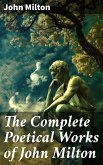Richard Barnfield's "The Affectionate Shepherd" is a captivating exploration of pastoral themes interwoven with homoerotic expression, reflective of the late 16th-century English literary context. In this poem, Barnfield employs a rich blend of pastoral and lyrical styles, crafting a vivid tableau of nature and affection between men. His use of lyrical eloquence and intricate imagery elevates the work, positioning it among the significant contributions to the genre, alongside contemporaries like Christopher Marlowe. The poem serves as both a celebration of love and an exploration of societal norms, offering an intimate glimpse into the emotional landscape of its subjects. Barnfield was a member of the early modern English literary milieu who navigated a world marked by rigid gender norms and burgeoning artistic expression. His own biography reveals a background steeped in the aesthetic contemplations of love and nature, perhaps influenced by his education at the University of Oxford and exposure to classical texts. This cultural and intellectual environment undoubtedly inspired his exploration of complex themes of desire and identity, making him a unique voice in the literature of his time. "The Affectionate Shepherd" is essential reading for those interested in queer literature, pastoral poetry, and the evolution of English poetry. Barnfield's craftsmanship invites readers to immerse themselves in a world where natural beauty and human connection intertwine, promising a profound contemplation of love that resonates through the ages.
Dieser Download kann aus rechtlichen Gründen nur mit Rechnungsadresse in A, B, BG, CY, CZ, D, DK, EW, E, FIN, F, GR, H, IRL, I, LT, L, LR, M, NL, PL, P, R, S, SLO, SK ausgeliefert werden.









